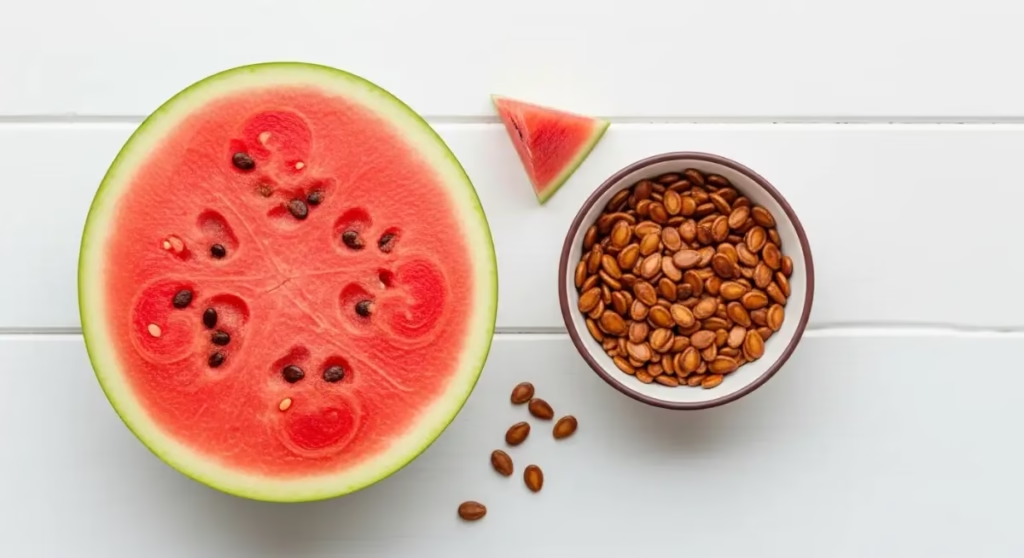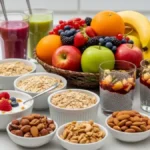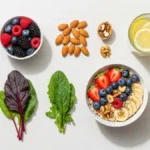When you enjoy a juicy slice of watermelon, you probably toss out the tiny black seeds without a second thought. But did you know those little seeds are packed with nutrients that can boost your health in surprising ways? In recent years, watermelon seeds have gained recognition as a nutrient-dense snack, often roasted or sprouted, and used in smoothies, salads, or even skincare routines.
In this article, we’ll explore what makes watermelon seeds so healthy, their nutritional profile, benefits, side effects, and creative ways to include them in your diet.
What Are Watermelon Seeds?
Watermelon seeds are the small, edible seeds found inside the watermelon fruit (Citrullus lanatus). While most people discard them, these seeds are full of nutrients such as protein, healthy fats, magnesium, zinc, and folate.
There are two main types of watermelon kernels:
- Black Seeds: Found in traditional watermelon varieties; fully mature and rich in nutrients.
- White Seeds: Found in seedless watermelons; these are immature versions and have fewer nutrients.
Roasted watermelon seeds have a nutty flavor similar to sunflower or pumpkin seeds, making them an excellent healthy snack alternative.
Nutritional Value of Watermelon Seeds
Here’s a quick look at the nutrients found in 1 ounce (28 grams) of roasted watermelon kernels:
| Nutrient | Amount |
|---|---|
| Calories | 158 kcal |
| Protein | 8 grams |
| Fat | 13 grams |
| Carbohydrates | 4 grams |
| Magnesium | 146 mg |
| Zinc | 2 mg |
| Iron | 1.3 mg |
| Folate | 60 mcg |
These tiny seeds are high in good fats, plant-based protein, and essential minerals, which help maintain overall health.
Top Health Benefits of Watermelon Seeds
1. Great Source of Plant-Based Protein
Watermelon seeds are rich in amino acids like lysine, arginine, and tryptophan. These compounds help repair tissues, support muscle growth, and improve metabolism. For vegetarians and vegans, they make a great natural protein addition.
2. Boosts Heart Health
The magnesium, zinc, and healthy fats in watermelon seeds can help regulate blood pressure and support cardiovascular function. Arginine, an amino acid in these seeds, helps in relaxing blood vessels and improving blood flow — reducing the risk of hypertension and heart disease.
3. Supports Healthy Skin
Packed with antioxidants and fatty acids, watermelon seeds promote smooth, glowing skin. Zinc supports collagen production, while magnesium helps balance hormones that can cause acne and inflammation.
4. Enhances Hair Growth
The proteins, iron, and copper present in watermelon seeds can improve scalp circulation, strengthen hair follicles, and promote healthy hair growth. Regular consumption or using watermelon seed oil can make hair shinier and stronger.
5. Aids Digestion
Though small, these seeds contain dietary fiber that supports digestive health. Eating them in moderation may reduce constipation and improve gut health.
6. Regulates Blood Sugar Levels
Magnesium in watermelon seeds plays a vital role in managing blood sugar. It supports insulin sensitivity, making these seeds beneficial for people with diabetes or those aiming to balance their blood sugar naturally.
7. Strengthens the Immune System
Zinc and iron boost immunity by helping in the formation of immune cells. This makes watermelon seeds an excellent addition to your diet during seasonal changes or flu season.
8. Promotes Bone Health
Magnesium, phosphorus, and copper in watermelon seeds strengthen bones and joints. Consuming them regularly supports bone density and reduces the risk of osteoporosis as you age.
How to Eat Watermelon Seeds
You don’t have to chew raw seeds from a watermelon directly. Here are some easy and tasty ways to include them in your daily meals:
1. Roasted Watermelon Seeds
- Rinse and dry the seeds after removing them from the fruit.
- Roast in a pan or oven for 10–15 minutes until crispy.
- Add a pinch of salt or spices for flavor.
Perfect for snacking!
2. Sprouted Seeds
Soak the seeds overnight, then allow them to sprout for 1–2 days. These sprouted seeds are easier to digest and more nutrient-dense.
3. Watermelon Seed Powder
You can grind roasted seeds into a fine powder and add them to smoothies, yogurt, or oatmeal for a protein and mineral boost.
4. Watermelon Seed Oil
Extracted from the seeds, this oil is rich in linoleic acid and antioxidants — great for both cooking and skincare.
Watermelon Seeds for Weight Management
If you’re trying to lose weight, watermelon kernels can help. They’re high in protein and good fats, which help you stay full for longer, preventing overeating. Magnesium supports metabolism and helps the body convert food into energy efficiently.
However, moderation is key — overconsumption can lead to calorie excess due to their fat content.
Possible Side Effects of Watermelon Seeds
While watermelon seeds are generally safe, it’s important to keep a few points in mind:
- Overeating may cause digestive discomfort due to their high fiber content.
- Salted or flavored roasted seeds may contain added sodium or oils — opt for plain or lightly roasted versions.
- People with nut or seed allergies should avoid them.
Always eat in moderation to enjoy maximum benefits safely.
Watermelon Seed Oil: A Hidden Skincare Gem
Watermelon kernels oil, also called Kalahari oil, is extracted from the dried seeds of the fruit. It’s a lightweight, non-greasy oil that deeply hydrates the skin.
Benefits include:
- Reduces acne and blemishes
- Moisturizes dry skin without clogging pores
- Balances oil production
- Improves skin elasticity
It’s often found in face serums, body oils, and hair products for its natural glow-enhancing effects.
Fun Facts About Watermelon Seeds
- In ancient Egypt, watermelon kernels were found in tombs as symbols of fertility and rebirth.
- Watermelon seeds are now used in snack bars, trail mixes, and plant-based protein powders worldwide.
- The world’s largest watermelon weighed over 350 pounds — imagine the number of seeds in that fruit!
How to Store Watermelon Seeds
To keep them fresh and crunchy:
- Store roasted or raw seeds in an airtight container.
- Keep them in a cool, dry place away from sunlight.
- They can last up to 3 months when stored properly.
Final Thoughts
Watermelon seeds are a small but powerful superfood. Packed with nutrients like protein, magnesium, and healthy fats, they support heart health, skin glow, and strong immunity. Instead of tossing them out next time, roast or blend them into your meals for a natural energy and nutrition boost.
So, next time you enjoy a juicy slice of watermelon — don’t throw away the seeds, eat them smartly!







